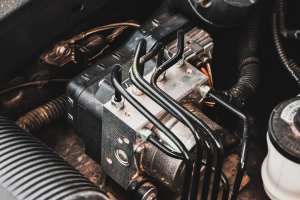Introduction
Let's face it: the world of cars can be a bit stressful, especially when your mechanic starts dropping terms like "engine control module." You might nod along, pretending to understand, but secretly wonder, "Engine control module, what does it even do?" Well, you're not alone! This post is here to simplify this important component and explain its role in keeping your vehicle running smoothly. Think of the engine control module (ECM) as the brain of your car — it controls everything from fuel efficiency to emission control. So, buckle up and get ready to dive into the world of ECMs and discover how this unsung hero plays an important role in your vehicle's performance.
1. Engine Control Module: An Overview
The engine control module, also known as the engine control unit (ECU), is the command centre of your vehicle, controlling various components. It's like the brain of the car — it receives data from a number of sensors throughout your vehicle, processes that information, and then uses it to control a multitude of functions.
Think of it as the puppet master pulling all the strings behind the scenes. It's responsible for everything from managing your fuel mixture, controlling the timing of your engine's ignition, regulating your emission system, and even helping your car start up on a cold winter morning. You might be surprised after reading this function list.
While it's well hidden, out of sight, its role in your vehicle is anything but small. Understanding what the engine control module does can help you grasp just how important it is to the overall health and performance of your car.
The engine control module is a bit like the conductor of an orchestra, coordinating all the different parts to create a harmonious output. If one instrument — or in this case, a vehicle component — stops working, it throws the whole performance off. That's why, when things start to go out of control, the engine control module is often the first place mechanics look.
So, the next time your mechanic mentions the engine control module, you can confidently move your head down and up, knowing exactly what they're talking about. Because now you know, when it comes to the question, "engine control module, what does it do?" The answer is, "a whole lot."
As we've established, the engine control module is an important component of your vehicle. But let's dive a bit deeper and examine how exactly it affects vehicle performance.
Fuel Efficiency
One of the most significant ways the engine control module impacts vehicle performance is through fuel efficiency. It continuously monitors and adjusts the mix of air and fuel that powers your engine. This optimal "air-fuel ratio" is crucial for your vehicle's performance and fuel economy. The engine control module ensures your car gets the most bang for its buck — or, in this case, the most miles from its fuel.
Emission Control
In today's world, where environmental conservation is of great importance, emission control is a hot topic. The engine control module plays a significant role in regulating the exhaust gas emissions of your vehicle. By controlling the fuel mixture and timing of the ignition, it helps keep those harmful emissions in check.
Engine Timing and Ignition
The engine control module also controls when each spark plug fires during the engine cycle. This ignition timing is critical for the engine to run smoothly and efficiently. It's a little bit like a dance routine — if the timing is off, the whole performance goes down.
Managing Various Vehicle Sensors
Your vehicle is equipped with a host of sensors, each feeding information to the engine control module. These sensors include everything from the oxygen sensor, which measures the amount of oxygen in the exhaust, to the throttle position sensor, which monitors the position of the throttle in an internal combustion engine. The engine control module processes this data to keep all the moving parts of your vehicle in harmony.
Understanding the role of the engine control module in vehicle performance helps you appreciate why maintaining it in good condition is so critical. It's like the heart of your vehicle, and just like your heart, you want to keep it in top shape. So, the next time you wonder, "engine control module, what does it do," think of it as the supervisor of your vehicle's performance, always working to keep things running smoothly.
3. Functions of the Engine Control Module
Now that we've covered the role of the engine control module in vehicle performance, let's move on to some of its major functions. This handy device is truly the unsung hero of your car's operation.
Processing Sensor Data
One of the primary functions of the engine control module is processing data from numerous sensors located throughout your vehicle. These sensors provide real-time input on everything, from the temperature of the engine to the speed of the vehicle.
The engine control module then uses this data to adjust the operations within your car. It's a bit like a very hard working office manager, continuously monitoring and adjusting to ensure everything runs smoothly.
Controlling Fuel Injection
Remember how we talked about fuel efficiency in the previous section? Well, that's largely down to how well the engine control module controls fuel injection. By adjusting the amount of fuel delivered to the engine, it can optimize performance and minimize fuel consumption.
It's like having a personal chef who knows exactly how much of each ingredient to use to create the perfect dish. In this case, the dish is your car's performance, and the ingredients are fuel and air.
Managing Ignition System
Another critical function of the engine control module is managing the ignition system. By controlling when the spark plugs fire, it ensures the engine runs smoothly and efficiently.
Think of it as the conductor of an orchestra, directing each instrument —or, in this case, spark plug — to play at just the right moment.
Regulating Emission Levels
The engine control module also works hard to regulate emission levels. It does this by adjusting the air-fuel mixture and the timing of the ignition, ensuring that your car's emissions don't exceed acceptable limits.
So not only is the engine control module helping your vehicle perform at its best, it's also doing its part to protect the environment. It's like an eco-warrior, working continuously to reduce the carbon footprint of your vehicle.
So when you ask, "engine control module, what does it do?" the answer is quite a lot. From optimizing fuel efficiency to managing the ignition system and controlling emissions, the engine control module is an essential part of your vehicle's operation.
4. Troubleshooting Common Engine Control Module Problems
Now that we've covered the ins and outs of an engine control module's functions, it's time to tackle some common problems. It's like becoming a car detective. Put on your thinking hats, because in this section you'll learn the hints your vehicle drops when its engine control module might need a check-up.
Unexpected Stalling or Misfiring
Ever had your vehicle suddenly stall in the middle of a journey? Or perhaps you've noticed your car misfiring. Both could be signs that your engine control module is in the non functioning state. It's like your car has a mind of its own — and not in a fun, Knight Rider kind of way.
Poor Fuel Efficiency
If you notice your vehicle guzzling more fuel and forcing you to make more visits to the gas station than usual, the engine control module might be to blame. Remember how we said it's like a personal chef for your car's engine? Well, if it's not mixing the ingredients properly, your vehicle will need more fuel to do the same amount of work.
Difficulty Starting the Engine
Here's a frustrating one: difficulty starting the engine. You turn the key, and... nothing. Or perhaps the engine turns over but doesn't catch. This could be a sign that the engine control module isn't managing the ignition system properly. It's like the conductor of your car's symphony has lost the beat.
Check Engine Light Illuminates
And finally, the most obvious sign of a potential engine control module issue: the dreaded check engine light. This little light could indicate a variety of issues, but if it's paired with any of the above symptoms, your engine control module might just be the culprit. It's the equivalent of your car waving a white flag and saying, "Hey, can we talk about this engine control module situation?"
So next time you find yourself asking, "engine control module, what does it do and how do I know if there's a problem?" remember these common signs. With a bit of detective work, you'll be able to keep your vehicle — and its busy engine control module — in great shape.
Conclusion
Now that you have a clearer picture of the engine control module, you can appreciate just how important it is to your vehicle’s operation. From managing fuel efficiency and ignition timing to regulating emissions and processing sensor data, the ECM is truly the mastermind behind many of your car’s essential functions. Next time you hear your mechanic mention the ECM, you'll understand that it’s not just technical jargon but a key player in keeping your car running at its best. Remember, a well-maintained engine control module means a smoother, more efficient ride, so don’t ignore the signs that it might need attention.
FAQs on
Engine Control Module What does it do?
-
1. What exactly is an engine control module (ECM)?
Ans.
The engine control module, also known as the engine control unit (ECU), is the central component that manages several functions in your vehicle. It acts as the brain of your car, processing data from multiple sensors to control fuel injection, ignition timing, emission levels, and more.
-
2. How does the engine control module affect fuel efficiency?
Ans.
The ECM monitors and adjusts the air-fuel mixture in your engine to make sure ideal performance and fuel economy. By fine-tuning this balance, it helps your car use fuel more efficiently, which can lead to better mileage and lower fuel costs.
-
3. Can a malfunctioning ECM cause my car to stall or misfire?
Ans.
Yes, if the ECM is not functioning correctly, it can lead to issues such as unexpected stalling or engine misfires. These problems occur because the ECM might not be managing the engine's functions as accurately as needed.
-
4. What are some common signs that the engine control module might be failing?
Ans.
Common signs include poor fuel efficiency, difficulty starting the engine, unexpected stalling or misfiring, and the illumination of the check engine light. If you notice any of these symptoms, it might be time to have your ECM checked.
-
5. How does the ECM contribute to emission control?
Ans.
The ECM regulates emission levels by adjusting the fuel mixture and ignition timing to make sure that your vehicle's exhaust emissions stay within acceptable limits. This helps reduce the environmental impact of your vehicle.
-
6. What should I do if I suspect there's a problem with my engine control module?
Ans.
If you doubt an issue with your ECM, it's best to have your vehicle inspected by a professional mechanic. They can diagnose the problem using diagnostic tools and determine whether the ECM needs repair or replacement. Regular maintenance can also help prevent ECM-related issues.


